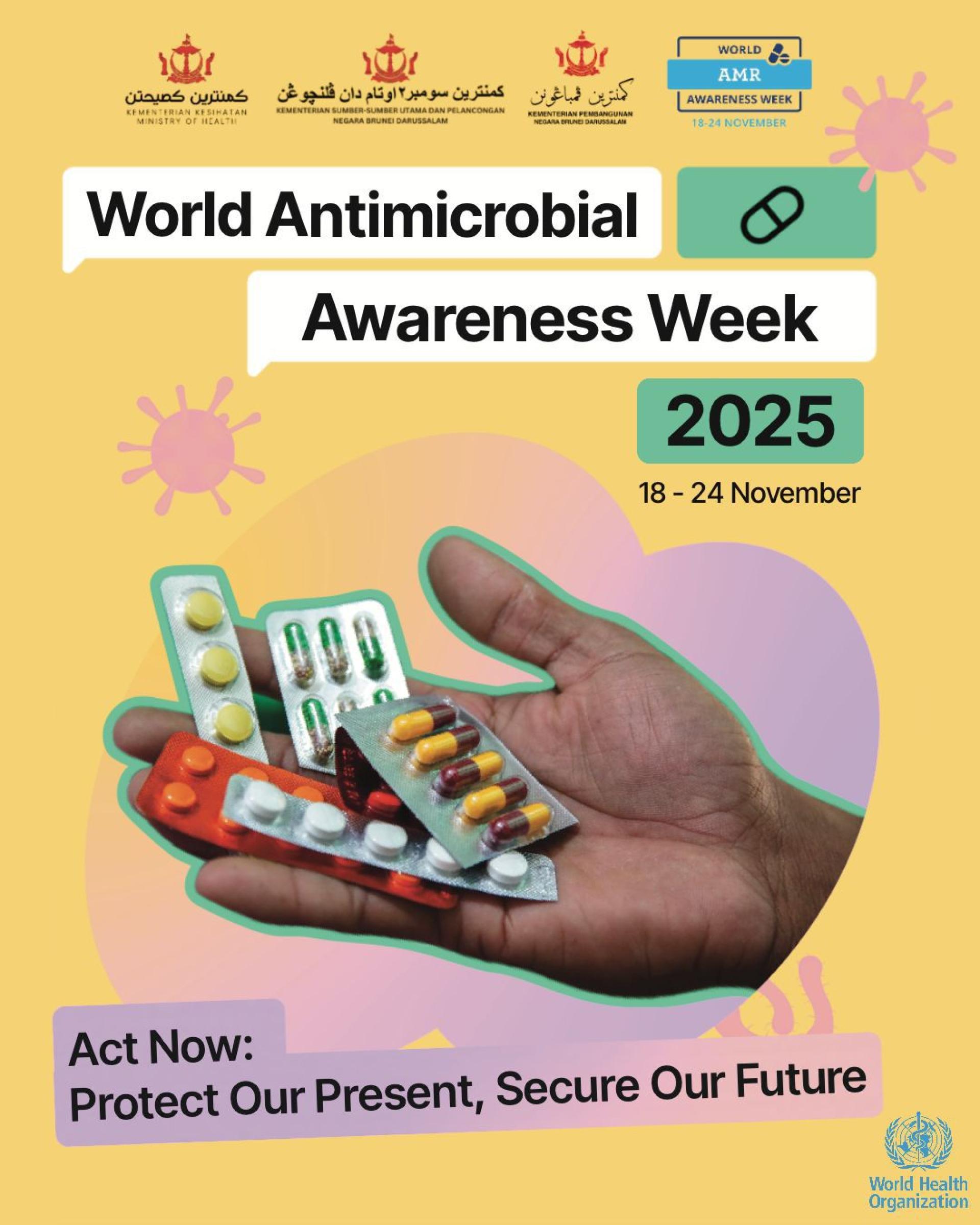(Bandar Seri Begawan, 21st) Every year from November 18 to 24 is World Antimicrobial Resistance Awareness Week (WAAW), aimed at raising global awareness of antimicrobial resistance (AMR), an urgent but often overlooked global health threat.
In conjunction with the 2025 Global Antimicrobial Resistance Awareness Week, Minister of Health Dato Isham, Minister of Primary Resources and Tourism Dato Manap, and Minister of Development Dato Juanda issued a joint statement.
This year’s WAAW theme is "Preventing Antimicrobial Resistance Together: Immediate Action to Secure Our Future," emphasizing the importance of taking decisive action to address AMR and contain its escalating threat. AMR has already caused devastating impacts on health, food systems, the environment, and the economy.
Antimicrobial resistance (AMR) is a serious public health problem, where infections become untreatable with antimicrobial agents, mainly resulting from misuse and overuse of antimicrobials. Its effects cover all types of microorganisms—including bacteria, viruses, parasites, mycobacteria, and fungi—and extend to humans, animals, plants, and the environment. AMR has become a severe threat to global health and food security, and brings enormous economic burdens.
In the health sector, the latest analysis forecasts that annual deaths due to bacterial resistance will rise from 1.14 million in 2021 to 1.91 million in 2050; related deaths are expected to increase from 4.71 million to 8.22 million. If uncontrolled, by 2035, global average life expectancy will decrease by 1.8 years. By 2050, AMR will also add $1 trillion USD annually in healthcare costs, and cause annual global GDP losses of $1.4 to $3.4 trillion by 2030. Just the treatment costs for drug-resistant infections could reach $412 billion per year, with labor losses up to $443 billion.
AMR likewise impacts animal health and global food production. Drug-resistant strains in terrestrial and aquatic food animals lead to higher animal mortality rates, threatening food security. It is projected that by 2050, livestock production in low-income countries will decline by 11%, affecting the livelihoods of hundreds of millions who depend on livestock and aquaculture.
The 2023 United Nations Environment Programme (UNEP) report points out that AMR issues are closely linked to the climate crisis; unsustainable human consumption and production patterns drive the rapid development of AMR in the environment. Poor sanitation conditions and inadequate management of sewage and wastewater are also key factors exacerbating AMR.
Global high-level commitments have been increasing since the mid-1990s. In 2015, the Global Action Plan on AMR (GAP) was launched, and a tripartite mechanism was established by the World Health Organization (WHO), the Food and Agriculture Organization of the United Nations (FAO), and the World Organisation for Animal Health (WOAH). In 2022, the United Nations Environment Programme joined, forming a quadripartite mechanism to advance the "One Health" collaborative model.
In Brunei, since the establishment of the Brunei Darussalam Antimicrobial Resistance Committee (BDAMRC) in 2018, the National Action Plan (NAP) has been advanced, with the Ministry of Development joining in 2024 to comprehensively implement the "One Health" strategy. WAAW has become the flagship annual activity of BDAMRC, enhancing public awareness of AMR through social media, exhibitions, educational webinars, health activities, and the "Wear Blue" campaign.
The statement pointed out that responding to AMR requires cross-sectoral government cooperation, continuous public awareness efforts, integrating AMR into policy agendas at all levels, and strategic actions across human, animal, and environmental health sectors. Every specific action—from policy-making to healthcare services, public education, and ecological protection—is crucial.
The statement calls on all sectors of society to "Act Now: Protect Our Present, Safeguard Our Future," to create a more sustainable and healthier future for current and future generations.
